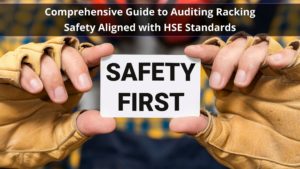
HSE racking regulations have remained largely the same since 2007, but this new fine system could shake things up a bit.
A lot of new changes in the way HSE operates has meant that the organisation now fines companies a lot more than it has done in the past. So what will this mean for HSE racking regulations? To understand this, it’s important to understand the two major factors behind the new way HSE fines businesses.
2012: HSE’s Fee-For-Intervention Cost Recovery Scheme
Since 2012, HSE has been operating under a “fee-for-intervention” scheme, aimed at reducing HSE spending by fining people relative to the amount of time and resources HSE needs to spend. In other words, as a reaction to the government’s continued reduced spending since 2010, HSE has been trying to turn a profit.
At the time, some criticised HSE’s new approach to fines, but the system has stayed in place for the last five years regardless. While the new system meant the potential for ever greater fines, no massive changes in the average fine were recorded. That is, of course, until now.
2016: HSE Updates the Way It Sentences Corporations
From 1st February 2016, HSE updated the way it fines corporations for breaking HSE law. In short, it gave courts the ability to fine corporations for a lot more money than they were previously able to. As such, the average HSE fine has risen from £69,500 to £211,000.
What Does This Mean for HSE Racking Regulations?
Increased fines mean increased incentives to make your workplace as safe as possible. In turn, these new fines should mean that more people follow HSE racking regulations than before and that businesses take them more seriously.
On the one hand, this is a great thing. With greater importance placed on the need for warehouse safety, HSE racking regulations will be followed more intently and employees will be safer as a result. On the other hand, heavier fines shouldn’t be the reason that businesses want to make their workplaces safer. If people had a negative attitude towards HSE racking regulations and HSE before, they’re unlikely to feel better about those things because of the threat of increased fines.
The facts will determine whether or not this new system will help decrease workplace injuries and fatalities. If it does, then it will be extremely hard to argue that this is a bad thing.
The Current State of HSE Racking Regulations
Since 2007, HSE has recommended racking inspections from a SEMA approved racking inspector at least once a year for all warehouses and storage systems in the UK. HSE also recommends regular internal racking inspections from staff who are “technically competent”.
In 2015, the new CDM regulations meant it was ultimately up to the “client” (the person in charge of the storage system in this case) to decide whether or not someone was “technically competent” enough to perform a given task. This didn’t change HSE racking regulations, but it has meant a heavier emphasis on employers’ own initiative and less on “card schemes”. Before the CDM regulations, a person could claim that they were “technically competent” because they had a card. Now, it is the client’s decision.
In other words, it’s up to the owner of the racking equipment to decide if someone is “technically competent” enough to inspect their racking. With regards to expert racking inspections, this is pretty black and white; HSE recommends SEMA approved racking inspectors. With regards to staff inspections, CDM regulations mean the onus of responsibility is on the client.
Like the CDM regulations, heavier fines won’t change HSE racking regulations. However, they might change businesses’ attitude towards them. Owners of racking systems have a lot more personal responsibility and have a much greater potential to be fined than they did two years ago. As such, racking inspections from a SEMA approved inspector and racking inspection training for staff are more important than ever.
If you are the owner of a warehouse or storage system, contact Storage Equipment Experts for a racking inspection from a SEMA approved inspector or racking inspection training. We cover all of the UK and Ireland!





